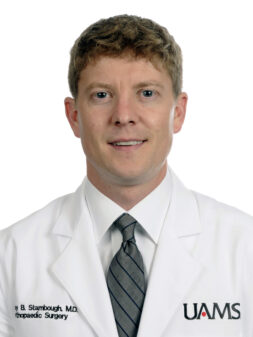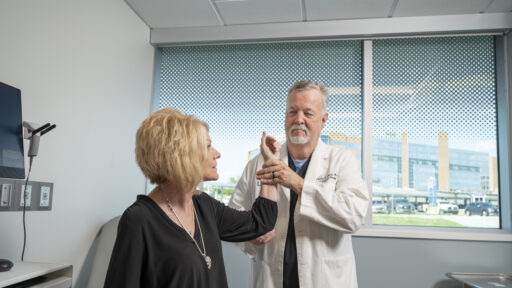Description
Dr. Jeffrey Stambough, fellowship-trained orthopaedic surgeon at UAMS, shares how patients can expect patient-centered care like they’ve never experienced through the quality of their interactions, the attention to detail, and the accessibility and efficiency of their visits.
Video Player
Transcript
[Dr. Jeff Stambough, Hip and Knee Surgeon, Department of Orthopaedic Surgery]
When patients come to my office at UAMS Orthopaedics — we have a clinic that’s off-site, so it’s easy to get in and out, easy for patients and families to manage — but what I hope to instill in the patients is that they can experience an efficient visit and a visit where their needs are identified and met on an individual basis, where we take all their records from prior treatments, incorporate with our exam and assessment, with newer images that we get — we usually obtain an x-ray in clinic to evaluate the hip or knee joint that is under discussion — and we put all that together to come up with a treatment option that’s suited for the individual patient.
At UAMS Orthopaedics, we really take a holistic approach to managing patients who especially come in with hip and knee complaints. A lot of patients have usually been treated by a primary care physician or someone else in the community, and usually hip and knee pain is not the sole thing going on in their life. There’s a combination of other chronic medical conditions or other painful joints or places in their body. So a lot of patients may have been or are currently taking opioid medications for a variety of reasons and we really try to work with the patient and their other medical providers to come off of those medications as much as possible, because we’ve learned through our research here that if a patient is to pursue a joint replacement or something needing a revision, like a revision joint replacement, that being on narcotics can really hinder their results, both from a pain aspect, from a functional recovery aspect, and may even place them at higher risk for needing more surgery down the line.
So, we really work on the front end to educate patients, to work with their providers to come up with new solutions, to try to wean off of their medications or at least wean down. And we see them back multiple times before pursuing the eventual surgery, if that is what is indicated.




